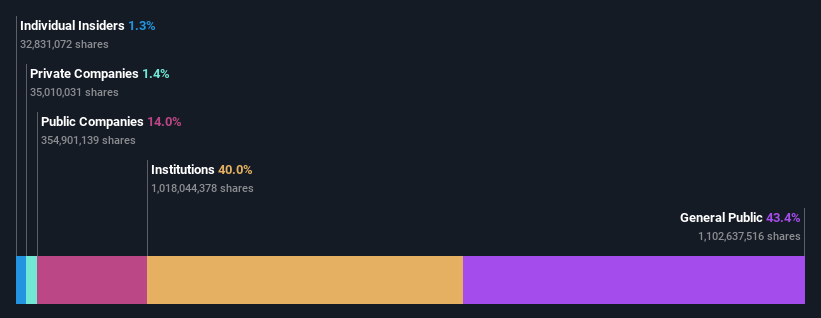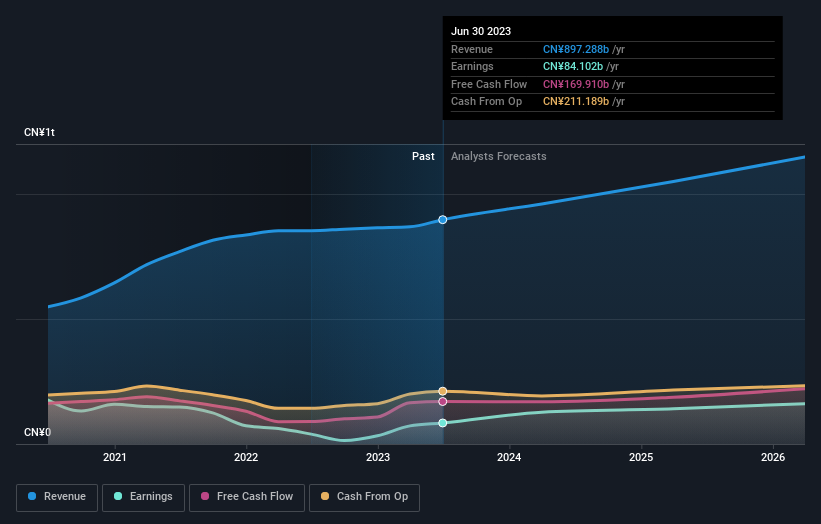Individual investors who have a significant stake must be disappointed along with institutions after Alibaba Group Holding Limited's (NYSE:BABA) market cap dropped by US$6.5b
Key Insights
Alibaba Group Holding's significant individual investors ownership suggests that the key decisions are influenced by shareholders from the larger public
35% of the business is held by the top 25 shareholders
A look at the shareholders of Alibaba Group Holding Limited (NYSE:BABA) can tell us which group is most powerful. The group holding the most number of shares in the company, around 43% to be precise, is individual investors. Put another way, the group faces the maximum upside potential (or downside risk).
Following a 3.0% decrease in the stock price last week, individual investors suffered the most losses, but institutions who own 40% stock also took a hit.
In the chart below, we zoom in on the different ownership groups of Alibaba Group Holding.
View our latest analysis for Alibaba Group Holding
What Does The Institutional Ownership Tell Us About Alibaba Group Holding?
Many institutions measure their performance against an index that approximates the local market. So they usually pay more attention to companies that are included in major indices.
Alibaba Group Holding already has institutions on the share registry. Indeed, they own a respectable stake in the company. This suggests some credibility amongst professional investors. But we can't rely on that fact alone since institutions make bad investments sometimes, just like everyone does. It is not uncommon to see a big share price drop if two large institutional investors try to sell out of a stock at the same time. So it is worth checking the past earnings trajectory of Alibaba Group Holding, (below). Of course, keep in mind that there are other factors to consider, too.
Alibaba Group Holding is not owned by hedge funds. Looking at our data, we can see that the largest shareholder is SoftBank Group Corp. with 14% of shares outstanding. Meanwhile, the second and third largest shareholders, hold 3.4% and 3.0%, of the shares outstanding, respectively.
A deeper look at our ownership data shows that the top 25 shareholders collectively hold less than half of the register, suggesting a large group of small holders where no single shareholder has a majority.
While studying institutional ownership for a company can add value to your research, it is also a good practice to research analyst recommendations to get a deeper understand of a stock's expected performance. There are a reasonable number of analysts covering the stock, so it might be useful to find out their aggregate view on the future.
Insider Ownership Of Alibaba Group Holding
While the precise definition of an insider can be subjective, almost everyone considers board members to be insiders. Company management run the business, but the CEO will answer to the board, even if he or she is a member of it.
Most consider insider ownership a positive because it can indicate the board is well aligned with other shareholders. However, on some occasions too much power is concentrated within this group.
We can report that insiders do own shares in Alibaba Group Holding Limited. Insiders own US$2.7b worth of shares (at current prices). It is good to see this level of investment. You can check here to see if those insiders have been buying recently.
General Public Ownership
With a 43% ownership, the general public, mostly comprising of individual investors, have some degree of sway over Alibaba Group Holding. This size of ownership, while considerable, may not be enough to change company policy if the decision is not in sync with other large shareholders.
Public Company Ownership
Public companies currently own 14% of Alibaba Group Holding stock. It's hard to say for sure but this suggests they have entwined business interests. This might be a strategic stake, so it's worth watching this space for changes in ownership.
Next Steps:
While it is well worth considering the different groups that own a company, there are other factors that are even more important. Consider risks, for instance. Every company has them, and we've spotted 1 warning sign for Alibaba Group Holding you should know about.
If you would prefer discover what analysts are predicting in terms of future growth, do not miss this free report on analyst forecasts.
NB: Figures in this article are calculated using data from the last twelve months, which refer to the 12-month period ending on the last date of the month the financial statement is dated. This may not be consistent with full year annual report figures.
Have feedback on this article? Concerned about the content? Get in touch with us directly. Alternatively, email editorial-team (at) simplywallst.com.
This article by Simply Wall St is general in nature. We provide commentary based on historical data and analyst forecasts only using an unbiased methodology and our articles are not intended to be financial advice. It does not constitute a recommendation to buy or sell any stock, and does not take account of your objectives, or your financial situation. We aim to bring you long-term focused analysis driven by fundamental data. Note that our analysis may not factor in the latest price-sensitive company announcements or qualitative material. Simply Wall St has no position in any stocks mentioned.

 Yahoo Finance
Yahoo Finance 

